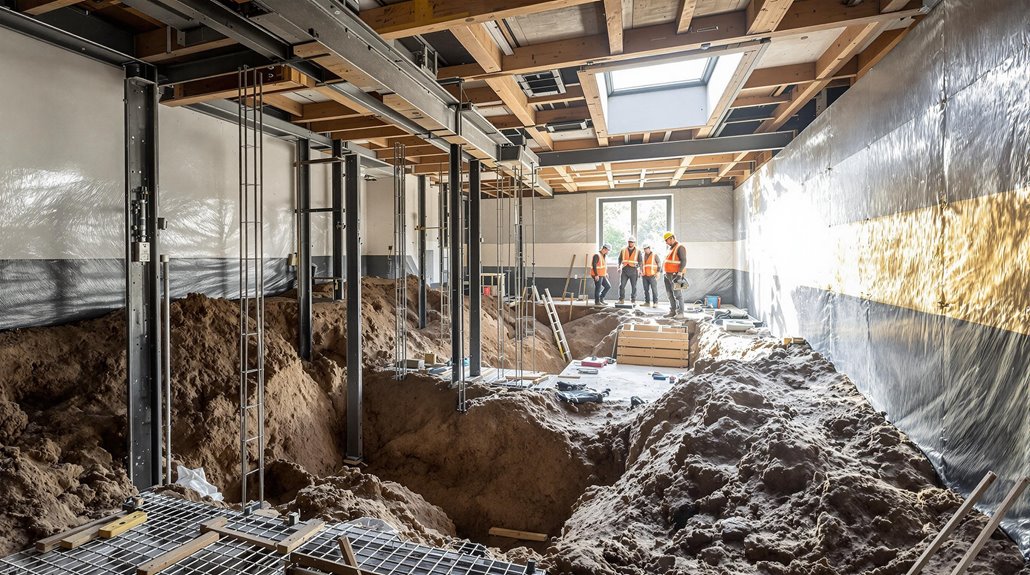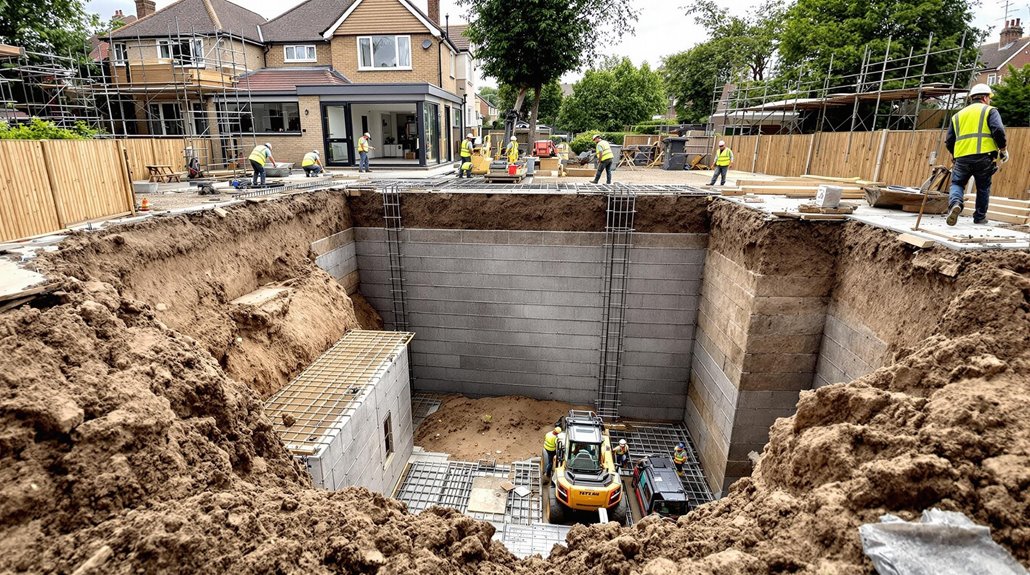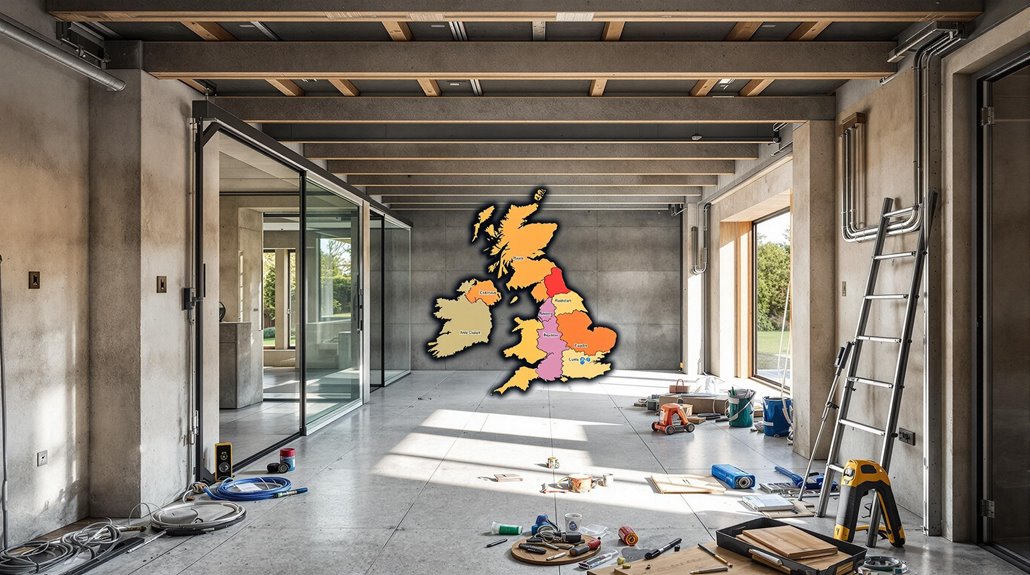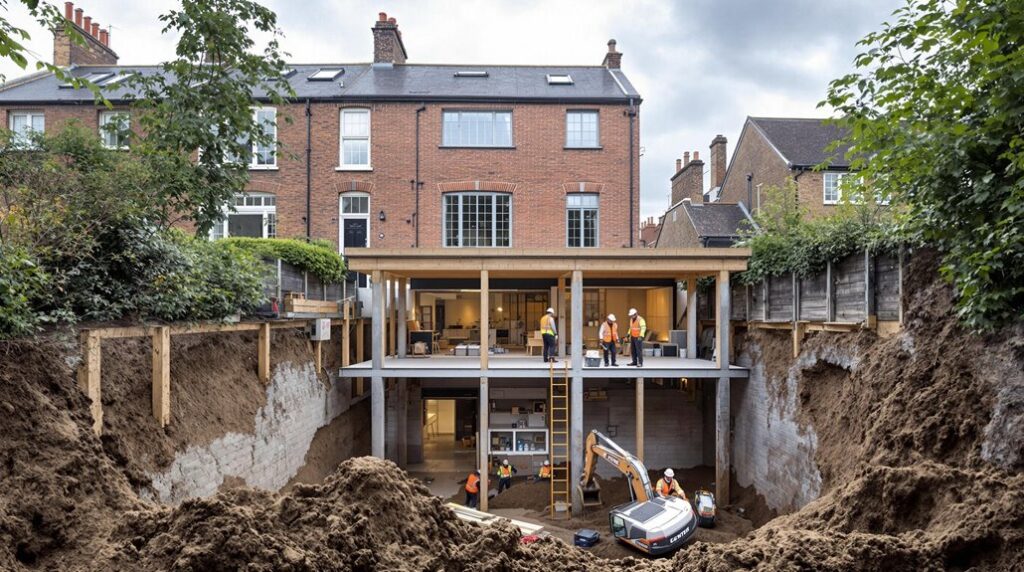I’ve analyzed the basement extension market across the UK, and I’ll tell you straight – you’re looking at a serious financial commitment that ranges from £1,500 to £3,000 per square meter. The numbers vary dramatically based on your specific circumstances, from soil conditions to structural complexity, and many homeowners underestimate the hidden costs that emerge during excavation. Before you make this investment decision, you need to understand exactly what drives these costs and how they’ll impact your budget.
Key Takeaways
- Basement extensions in the UK typically cost £100,000-£180,000, with average projects ranging from £140,000-£160,000.
- London has the highest costs at £4,400-£5,500 per square metre, significantly more expensive than other UK regions.
- Small basements (20-30 sqm) cost £100,000-£160,000, while large projects (70-100 sqm) can reach £308,000-£550,000.
- Additional expenses include professional fees (10-15%), VAT (20%), and contingency funds (10-15%) on top of base costs.
- Basement extensions cost double that of single-storey extensions but add 10-20% property value when planning restrictions limit options.
Average Cost Ranges for Basement Extensions in the UK

When planning a basement extension in the UK, you’ll face substantial costs that typically range from £100,000 to £180,000 for most projects. I’ve found that many homeowners underestimate these figures, but understanding the reality helps you budget effectively.
The average cost sits around £140,000 to £160,000, though your project can easily exceed £180,000 depending on specifications. These aren’t small numbers, but they reflect the complex nature of basement work. Notably, a basement extension can significantly increase property value, making it a worthwhile investment despite the high costs.
What makes basement extensions particularly expensive is the groundwork – excavation, underpinning, and structural work represent significant fixed costs. Even smaller basement projects carry these expenses, making them relatively costly per square metre compared to above-ground extensions. You’re fundamentally paying for the technical complexity of digging deep and building strong foundations. The entire construction process spans approximately 9-15 months when you factor in planning approval, major construction work, and final fit-out completion.
Key Factors That Drive Basement Extension Costs
While basement extensions offer valuable space, several critical factors determine whether you’ll pay closer to £100,000 or well beyond £200,000. I’ll break down what drives these costs so you can budget effectively.
Excavation complexity tops the list. You’ll face higher expenses with rocky soil, high water tables, or deep foundations requiring underpinning. Urban locations like London amplify costs through restricted site access and premium labor rates. Many homeowners opt for modern design elements that can enhance both functionality and aesthetic appeal during renovations.
Structural requirements can’t be compromised. Reinforced concrete walls, steel support beams, and waterproof tanking systems are non-negotiable but expensive. Your interior choices matter too – premium kitchens add £15,000-£40,000, while luxury bathrooms cost £10,000-£20,000.
Don’t forget professional fees (10-15%), VAT (20%), and contingency funds (10-15%) for unexpected complications. Clay-heavy soil may require additional reinforcement measures, further increasing your foundation costs.
Comparing Basement Extension Costs to Other Home Extensions

Before committing to a basement extension, you’ll want to understand how it compares financially to other home expansion options. I’ve found basement extensions are consistently the most expensive choice, costing £4,400-£5,500 per square metre in London compared to single-storey extensions at £2,300-£3,400 per square metre. For a 30m² project, you’re looking at £132,000-£165,000 for basement versus £69,000-£102,000 for single-storey. Garage conversions offer the most budget-friendly option at £8,500-£20,000, making basements cost 5-20 times more. However, basements excel when you can’t build outward due to planning restrictions or limited garden space. They preserve your outdoor area while maximizing your home’s footprint potential. Moreover, permitted development rights allow certain types of extensions without the need for planning permission, which can be beneficial when considering the overall project. Despite the higher costs, basement extensions can add value to your property, with extensions typically increasing property worth by 10-20%.
Cost Breakdown by Project Size and Scope
Understanding your basement extension’s total cost requires breaking down expenses by project size, as the scope directly impacts both structural complexity and material requirements. I’ll walk you through the three main categories that’ll help you budget effectively.
Small projects (20-30 sqm) cost £100,000-£160,000, perfect for single-room additions like home offices. Medium projects (40-60 sqm) average £176,000-£330,000, accommodating multi-room layouts with enhanced structural support. Large projects (70-100 sqm) span £308,000-£550,000, often featuring luxury elements and advanced waterproofing systems. The average cost for basement extensions can vary significantly based on the project’s specific requirements and location.
Critical factors affecting your budget include excavation depth (adding 20-30% for multi-level designs), ground conditions, and access constraints that can inflate costs by 15-25%. Premium finishes can double base estimates, so plan accordingly. Basement extensions are typically found in high land value areas due to their complex construction requirements and substantial investment costs.
Regional Price Variations and Premium Feature Costs

Location greatly impacts your basement extension budget, with costs varying by up to 40% across different UK regions. In London, you’ll face the highest costs at £2,395 per square metre, with basement projects typically running 20-30% more than other extensions. The South East and East of England follow closely, with construction costs ranging from £2,500 to £3,500 per square metre due to higher labour and material expenses. Utilizing a cost calculator can help homeowners estimate potential expenses accurately.
Premium features can push your costs well above £3,000 per square metre. Custom glazing, complex steelwork, and high-end finishes define these premium specifications. Floor-to-ceiling windows, designer radiators, and open-plan designs requiring structural engineering all add significant expense. High-end kitchens or bathrooms within your extension further elevate costs, making careful specification planning essential for budget control. Remember that these costs exclude land purchase, professional fees, and VAT, which must be factored separately into your total project budget.
Conclusion
I’ve shown you that basement extensions demand serious financial commitment, typically £100,000-£180,000 in 2025. You’ll face complex excavation costs, structural engineering fees, and premium waterproofing requirements that can quickly escalate your budget. While you’re getting excellent value per square foot compared to other extensions, you can’t ignore the regional variations and high-end finishes that’ll push costs higher. Plan for 20% contingency – basement projects don’t forgive poor budgeting.
References
- https://www.homehow.co.uk/costs/basement-conversion
- https://www.checkatrade.com/blog/cost-guides/house-extension-cost/
- https://designfor-me.com/project-types/extensions/how-much-does-a-basement-extension-cost/
- https://www.ratedpeople.com/blog/house-extension-cost
- https://buildpartner.com/how-much-does-it-cost-to-build-an-extension-in-2025-a-uk-guide/
- https://www.risedesignstudio.co.uk/blog/whats-the-cost-of-extending-your-home-in-london-in-2025
- https://resi.co.uk/advice/house-extensions/house-extension-cost
- https://www.studiocolab.co.uk/london-house-extension-cost/
- https://www.priceyourjob.co.uk/convert-basement-cost/
- https://costmodelling.com/building-costs

